When I was a young boy, seemingly immune to my mother’s constant focus on all things neat and proper, I spent my summers mucking around in the swamp behind our house. As swamps go, ours was neither large nor particularly dangerous, boasting not one single crocodile, alligator, poisonous snake or patch of quicksand. To be absolutely candid it was a small swamp, and its most perilous (if you could call them that) denizens were snapping turtles and water snakes, either of which might decide to give you a nip if you happened to stick a finger or toe in the wrong place.
Still, the occasional nip was about the worst you could expect. Weighed against the opportunity to collect frogs and salamanders, garter snakes and painted turtles, the ledger came down squarely in favor of adventure amidst the cattails and rushes.
And if I happened to come home covered from top to bottom in black mud, with a little bright green swamp scum thrown in for good measure ... well, it was a small price to pay for the opportunity to root around in a landscape virtually untouched by civilization.
In retrospect, my father could never quite understand how the swimming pool in our backyard could attract so many of God’s creatures. Of course, he viewed the swimming pool as just that ... a swimming pool. I looked at it more along the lines of a terrarium. After all, you’ve got to have someplace to keep your newly acquired friends.
If nothing else, my lifelong adventures — season after season of crawling around in swamps, followed by decades of meandering through forests and fields, alongside rivers and over mountains — have brought home what I consider to be a rather indisputable point. We — and by “we,” I mean all of humanity, each and every one of us — are a part of nature. Yet from the Oval Office to the lecture halls of our universities, from the pews of our churches to the boardrooms of our corporations, I see no evidence that Americans are aware of this basic fact of life. It’s almost as if we’ve come to the conclusion that human beings have somehow transcended the natural world and reached a point of technological independence; that we’ve finally cut our tethers to the Earth’s evolutionary system of checks and balances and created that “shining city on the hill.”
Unfortunately, these flights of fancy are demonstrably untrue and it appears that someone needs to stand up and state the obvious. As living, breathing creatures, we can no more separate ourselves from the natural world than we can drive our cars to the moon. Our health and well-being are inextricably tied to this planet’s, and any conjecture to the contrary is either an artifice or a conceit.
So what are we to do? How can we possibly reconcile our culture’s manifest desire to exist outside of nature’s constraints with the fact that those constraints continue to apply to us?
These are hard questions to answer, if only because our future depends so completely upon our response.
Before we consider our options, though, it might be prudent to address a salient point. Many of us have a tendency to believe that simple ideas are not profound and that complicated solutions have more merit than less-complicated solutions. If you find this bias creeping into your thoughts over the next few minutes, you might want to acknowledge its influence.
That said, we are in the midst of an unprecedented period of change. A species — our own — has developed the ability to manipulate its surroundings on a truly large-scale basis. To the best of our knowledge this has never happened before. Consequently, we need to realize that the decisions we make over the next few years will alter both our social structure and our environment for the foreseeable future.
Which brings us to subjects like global warming, ocean acidification, nuclear proliferation, chemical and biological weapons, exponential population growth, acid and chemical rainfall, urban sprawl, surface and groundwater pollution, deforestation, accelerated loss of individual species and their habitats, our reliance on nonrenewable forms of energy, our overuse of pesticides and antibiotics ... the list goes on and on. It’s a long and depressing litany, and it frequently seems that this smorgasbord of problems breeds two very different types of responses.
On one hand we have the Chicken Littles, who tell us that the sky is falling or, at the very least, filling up with holes.
On the other we have the Ostriches, who bury their head in the sand and claim that everything is fine and dandy, and that if we do encounter a little turbulence on the jetliner of progress, why, technology and science will surely rescue us before we crash.
With all due respect to the people who champion both sides of this controversy, I’d like to suggest that our emphasis needs to shift from a debate over the symptoms of our current malaise to something far more important. Before we can move forward, we need to develop a shared vision for the future. In fact, let’s make that vision with a capital V — Vision — because therein lies humanity’s best hope, not just for survival, but for a meaningful, rewarding existence.
I know. That’s a tough charge, especially when the dominant social, political, and corporate structures of our era find it expedient to focus on the next six months rather than the long term. And why is that? Well, there are any number of plausible answers, but the one that rings true, at least for me, is that we’re far better at reacting than we are at acting. Acting, of course, requires a plan, a vision. Reacting doesn’t.
To be frank, we seem to have misplaced our priorities. Instead of living in the moment while planning for the future, we live for the future while planning in the moment. At first glance, that might not seem like a huge distinction. Believe me, it is.
Contrast our approach with that of the Iroquois Confederation, which considered the impact its actions would have on the next seven generations. That’s not seven days, seven weeks or seven years, but seven generations. My uncle, a retired U.S. Army Colonel, likes to talk about the military’s emphasis on understanding second, third and fourth-order effects; how an incident or event will generate a response, which will in turn elicit a second set of responses, then a third, and so on. The Army puts a tremendous amount of energy into anticipating and planning for these eventualities. And on those few occasions when it doesn’t, when expedience and short-term thinking set the course instead, we end up with situations like our monumental difficulties in the Middle East.
The Iroquois, of course, had the benefit of living close to nature, of accepting both its bounty and its limitations. It was relatively easy for them to anticipate the effects of their decisions, especially given the inherent stability of their society. In our world, where we’re faced with both an imagined separation from nature and our ofttimes counterproductive emphasis on safety, security, and ease — isn’t it strange how we place such a premium on concepts that seem, on closer examination, to be the antithesis of real life? — we’ve chosen to emphasize something many older societies never even considered. Distractions.
For what else are video games, television, and the internet? Instead of living our lives fully and in the moment, we court mental, physical, and emotional diversions. Sadly, this emphasis on “entertaining ourselves” makes it very difficult to look honestly at the world around us. It also precludes the possibility of Vision, whether on a personal or societal level.
So what can we do? Ah, my friends, here’s where simplicity rears its head. We can decide, indeed, we must decide, both individually and on a collective basis, what’s truly important. Important in our lives, important to our loved ones, important for the future. What do we need to emphasize? Do we focus on our rights, or on our responsibilities? On knowledge or wisdom? Technology or nature? Individuality or conformity? Logic or emotion? Spirituality or materialism? The list goes on and on, but our choices are critical. We must consider what we want for the future, make our decisions consciously — acting rather than reacting — and then move forward for both ourselves and the generations that follow.
Yes, I told you it was simple. But please don’t confuse simple with easy. We’re on the easy path right now, the road that leads to incremental thinking, to quarterly forecasts, and quite possibly, to a sudden and precipitous plunge from the cliff. As the old Chinese proverb warns, “Unless we change direction, we are likely to end up where we are headed.” The problem, and unfortunately it’s a big one, is that we’re roaring along with our foot on the gas, yet the highway before us — or should we say the future? — is hidden in shadows. It might make sense to turn on our headlights, but that simple act of self-preservation requires a conscious choice. Do we have the wisdom and discipline? Only time will tell.
Perhaps, given the paucity of long term thinking in our culture, the best place to start this entire process is with an idea. A simple one. An Apache elder once noted that there are only four things worth working for here on Earth: peace, love, joy and purpose. He believed that every single positive element of human existence flowed directly from our search for those four holy grails.
We need to define our role as human beings. If each of us sat down and decided what was truly important to us — as opposed to what our friends, our coworkers, or the advertisers on Madison Avenue might suggest — then we’d at least have a starting point, a goal to shoot for. And once we had that goal in sight, we’d have a way to measure and define all those questions. What are technology’s highest uses? Can we learn about sustainability and growth from cultures different than our own? Does it make sense to carve up the landscape and sacrifice our air and water for short term economic gain? Where does education fit in the mix? Are we simply “consumers,” existing to feast off (and sustain) the corporate buffet, or is there more to life?
I can’t answer these questions for you. No one can. Your heart and your head are the only arbiters that matter. I would suggest, though, that you give these issues the attention they deserve. Without a Vision, our society has little real hope. And what is society’s Vision, other than the sum of the smaller Visions we all contribute? In the end, we each make a difference.
I once watched an osprey, one of our most regal birds, hover in the sky over Montana’s Madison River. He waited on hummingbird wings, holding himself motionless with a wing beat so fast it started to blur in the late afternoon sun, and then he dove straight down into the water below. A second later he disappeared with an enormous splash, completely immersed in the frigid current. I wasn’t sure any bird could survive in that icy maelstrom, even an osprey, but after a moment or two he fought his way free with a great trout clutched in his talons.
Unfortunately for the osprey, his fish was too heavy to lift from the water, so he was forced to swim toward shore with his prize. He struggled against the heavy flows, beating his wings against the water in a show of indomitable will until he eventually reached the river’s edge. Yet there he sat, for even on dry land his trout proved too large to carry off. When I left the river perhaps twenty minutes later he was still perched atop his family’s dinner; hoping, I’d imagine, for some sort of miracle to help him lift his trout and carry it home.
As that osprey proved, strength bereft of Vision is still likely to fall short. With not only our future, but our children’s and grandchildren’s futures at stake, we need to look honestly at ourselves and at the world around us. Then we have to focus on a common purpose, a shared and worthy goal that will bring our civilization back into alignment with the parameters of the natural world. It won’t be easy. In fact, most of the time it seems like an impossible dream. Yet it’s the only option that truly makes sense. For in the end, one overarching truth is self-evident. Before we can move forward, we must open our eyes.




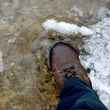
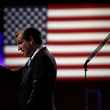

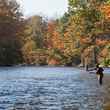


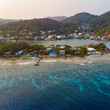

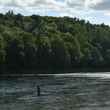

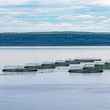

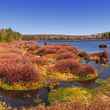



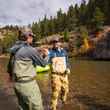





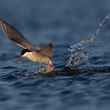





Comments
John Dean replied on Permalink
Beautifully put Todd and certainly nothing there I can disagree with. However the difficulty of the task appears to me to be beyond the ability of mankind to remedy. Many of us are environmentally aware but find it impossible to lead a life that causes no harm to the natural world. For example my fishing largely takes place a couple of hours away and without my car I simply couldn't do it. Big dilemma?
I do hope you make a difference Todd. All the best.
J.
Pages